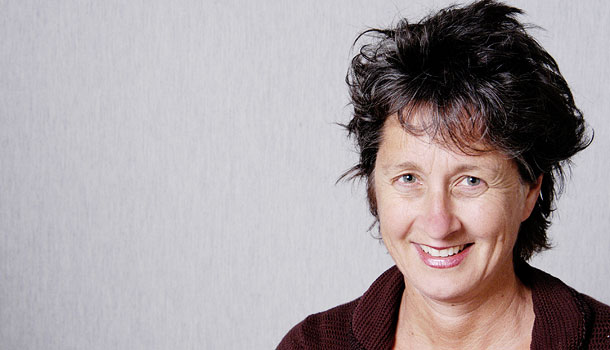
Julie Guthman
Food, Politics and Economy
Santa Cruz
The first thing you notice about Julie Guthman is her sense of humor, which shouldn’t be rare among people researching the subject of food, one of life’s most reliable pleasures. But the way Americans eat has become serious business — some say deadly serious.
If TV reality shows, diet books and the proliferation of farmer’s markets are any indication, Americans have become obsessed with controlling their diets. In her new book, Guthman, a self-professed “foodie” and associate professor community studies at UC Santa Cruz, explains why buying organic apples won’t solve America’s food problems and might not help you lose that extra 20 pounds either.
Guthman has an MBA and a Ph.D. in geography from UC Berkeley and blogs for the New York Times. (See her recent piece, “Enough with the Calorie Counting.”) Her article “The Food Police: Why Michael Pollan Made Me Want to Eat Cheetos” reprinted in late 2008 by Utne Reader, received national attention. In her forthcoming book “Weighing In: Obesity, Food Justice, and the Limits of Capitalism,” Guthman draws on science and economics to question the pervasive myths that drive our obsession with food.
Question:
You started your book with details about your own background, but told readers it made you nervous. Why did you decide to do it?
Answer:
The story connected some of the book’s themes, including the power of “healthism” in the conversation about food, the idea that an individual’s healthy choices convey moral superiority. My father had been bedridden as a child and became what they used to call a “health food nut.” He owned a health food store in southern California. He was friends with Jack LaLanne and the other food gurus of the time. I grew up eating these dense whole wheat honey carob chip cookies. They were horrid.
Question:
The reasons usually given for the collective weight problem in America sound very much like a Jack LaLanne diagnosis of bad food choices and lack of exercise. Yet the studies cited in your book doubt those explanations.
Answer:
Many people assume that poor people can’t afford better food so they rely on cheap, high-calorie meals. But a USDA study found that calorie intake is similar between different social groups. The study relied on people reporting on their own eating habits, which is always iffy, but the conclusions were provocative. We assume that people of low socioeconomic status are bigger because of what they eat, but it is just as likely that they have low socioeconomic status because of their size, because there is so much discrimination in education and jobs and wages.
Question:
One of the possible reasons you cite for weight gain in America is environmental toxins. What is the evidence?
Answer:
Emerging science shows that environmental toxins, mostly endocrine-disrupting chemicals, are producing fatness irrespective of calories. People often think that this means altering metabolism but it’s much more fundamental. Studies with lab animals show that exposure to a variety of chemicals are producing animals that grow up to three times bigger in adulthood. Studies also show that stem cells that have no particular destination become fat cells when exposed to these chemicals.
Question:
Which chemicals are we talking about?
Answer:
BPA has received the most attention because of its use in plastic bottles, but there’s also tributyltin (TBT), which is found in boat paint, perfluorooctanoic acid (PFOA), which is used in Teflon pans and food containers, and various pesticides.PFOA is being phased out, but it’s been found in the blood of 95 percent of Americans.
Question:
So the fatness epidemic may the canary in the coal mine?
Answer:
The focus is on people eating cheap hamburger because it’s got fat and sodium, but it may be the hormones that we should worry about.
Question:
If these chemicals are potentially dangerous, why is not buying locally grown organic produce a political act?
Answer:
Buying organic apples at the farmers’ market won’t put a lid on dangerous and unjust food production in the United States. We’ve created a two-tier food system, with healthier choices for wealthier people. And the missionary approach to “educating” poor people about food, or making fruits and vegetables more available, is limited.
Question:
What questions should we be asking?
Answer:
We have to look at taxation policy, farm policy, financial regulations, environmental regulation.
Question:
Tax policy?
Answer:
Suburban sprawl is believed to be one of the causes of obesity. If this is true, then we have to look at the tax incentives that encourage sprawl. But there’s a caveat. The causal relationship between weight and the built environment isn’t proven, so we may be gentrifying communities without addressing the issue of size and health.
Question:
What about environmental regulation?
Answer:
Many Americans would be surprised to know just how many of the substances that go into our food, our furniture, our makeup and our environment in general remain unregulated. It’s difficult for even the most informed consumer to keep up with the list. Dealing with these chemicals requires political choices, policy choices. Not choices about what to cook, or even, ultimately, what to buy.
Question:
You live in Berkeley, the epicenter of the virtuous food movement, yet you have become known as a debunker of its gurus. What is your take on Alice Waters' Chez Panisse, the mothership for the local organic movement?
Answer:
Great food!